SOMALIA: La pesca puede ser una mina de oro si se disminuye la piratería
A fisherman carries a swordfish on his back from the Indian Ocean waters to the market in Somalia's capital Mogadishu, December 18, 2012. REUTERS/Ismail Taxta
http://www.straitstimes.com/breaking-news/world
.
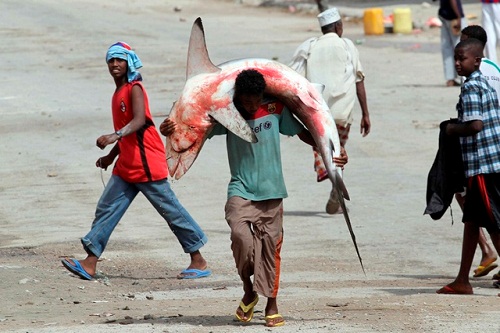
Somali fishermen carry Shark/swordfish on their heads and shoulders from the Indian Ocean waters to the market in Somalia`s capital Mogadishu December 18, 2012
.
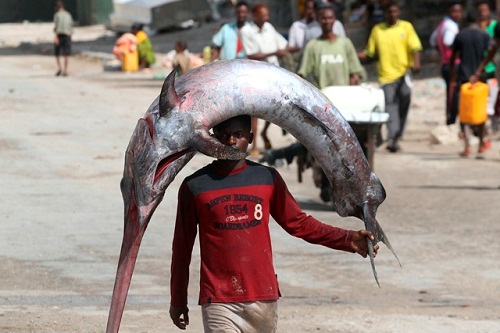
Pescadores somalíes llevar tiburones y peces espada de las aguas del Océano Índico al mercado en Mogadiscio (diciembre 18, 2012. REUTERS / Ismail taxt)
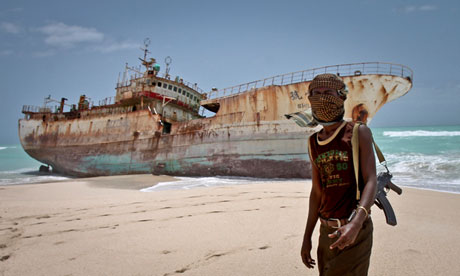
SOMALIA: La pesca puede ser una mina de oro si se disminuye la piratería
.
Berbera, 18 de diciembre de 2012 (ONU Red Integrada de Información Regional / All Africa Global Media) - cascos oxidados de barcos volcados decorar las aguas alrededor de Berbera, una ciudad portuaria en la autoproclamada república de Somalilandia. Más debajo de las costas de Somalia, cargueros piratas incursionan en el Golfo de Adén.
http://www.biyokulule.com/view_content.php?articleid=5523
Se están realizando esfuerzos para ayudar a los somalíes a hacer un mejor uso de sus 3,300 km de costa - la más larga en el continente africano - mediante el incremento de las exportaciones de pescado y mariscos a los lucrativos mercados en el Oriente Medio y Europa.
En 2013, la Unión Europea prestará USD 6.5 millones para ayudar a Somalilandia a lograr el objetivo a largo plazo de capturar 120.000 toneladas de pescado al año, cuyas ventas podrían generar USD 1,2 billones en moneda extranjera.
"En Somalia, la gente ha vivido durante mucho tiempo de espaldas al mar", dice Isabel Faria de Almedia, jefe de desarrollo de la UE para Somalia. "Es un país agro-pastoril con una fuerte tradición nómada. Creemos que hay un enorme potencial para la exportación y el consumo de pescado."
Hasta la segunda mitad del siglo 20, pocos somalíes fuera de las comunidades pesqueras, recurrían al consumo del pescado y el sector era completamente artesanal. Esto empezó a cambiar en la década de 1970 con el desarrollo de mejores instalaciones de almacenamiento frigorífico y la creación, con la ayuda soviética, de una flota industrial. Pero, por falta de piezas de repuesto y mantenimiento, las embarcaciones caían en desuso rápidamente los vasos. (Vea información histórica de pesquería somalí (un poco antigua))
.
Sacando a los piratas de la piratería
A mediados de la década pasada, los pescadores somalíes se quejaron de que estaban siendo forzados a la piratería por los barcos arrastreros extranjeros que esquilmaban ilegalmente sus recursos pesqueros.
Hubo un "eureka" cuando los autoproclamados guardacostas somalíes incautaron un barco pesquero extranjero y multaron a los propietarios … pronto se dieron cuenta de que secuestrar embarcaciones era más lucrativo que competir con las naves pesqueras extranjeras por las poblaciones de peces en declinación.
Amina Farah Arshe, que emplea a 40 pescadores a bordo de 11 naves en Berbera, el principal puerto de Somalilandia, cree que los ingresos pesqueros podría proporcionar alternativas a las incursiones tras los cargueros por el océano Índico. "Podemos detener la piratería empoderando a la gente. Podemos detenerla dando trabajo a los jóvenes. La gente ganaría dinero, el gobierno recaudaría ingresos tributarios y disminuiría la piratería ", dijo. "Propósito necesitamos apoyo. Necesitamos capacitación, embarcaciones, artes de pesca y almacenamiento en frío".
Durante años, las Naciones Unidas han sostenido que combatir la piratería somalí implican crear trabajo para los jóvenes somalíes desempleados que tripulan los esquifes, armados con rifles de asalto y granadas propulsadas por cohetes, para cazar buques en alta mar.
Pero sólo ahora la situación de seguridad relativa ha hecho esto una posibilidad realista. Somalia ha optado recientemente por su presidente más viable y por su mejor gobierno en años. Las fuerzas de la Unión Africana y de Somalía han expulsado a los insurgentes de Shabab Al de las grandes ciudades.
Buques de guerra extranjeros en el mar y guardias de seguridad privados sobre cubierta, han disuadido la piratería. Sólo 70 allanamientos tuvieron lugar en los primeros nueve meses de 2012, frente a 199 en el mismo período del año pasado, según la Oficina Marítima Internacional (International Maritime Bureau).
.
Reto logístico
El nuevo presidente de Somalia , el jeque Hassan Mohamud dice que quiere" aumentar los productos alimentarios locales para poner fin a la pobreza para siempre. " Unos 2,1 millones de personas en el país se enfrentan al hambre, en particular en el turbulento sur.
El futuro de la pesca a gran escala en las aguas de Somalia está atado en una batalla legal para determinar hasta donde se extienden las aguas costeras del país. Si bien la Convención de Naciones Unidas sobre el Derecho del Mar, que Somalia ratificó en 1989, establece 12 millas náuticas de la costa como una norma internacional para las aguas territoriales de los estados , Somalia ha afirmado que sus aguas alcanzan las 200 millas mar afuera. Mogadiscio ha resistido la presión internacional para declarar las aguas exteriores desde las 12 a las 200 millas sólo como su zona económica exclusiva, una designación que confiere numerosos derechos al país pero que significa menos soberanía plena. (Ver aquí para más detalles.)
Alan Cole, que dirige las operaciones contra la piratería de la Oficina de Naciones Unidas contra la Droga y el Delito, dice Berbera en Somalilandia y Bosaso en Puntlandia tienen potencial real. Pero la exportación de pescado fresco de la remota costa central - base de muchos piratas - ofrece un "desafío logístico".
La agencia de la ONU gasta $ 40 millones cada año en la lucha contra la piratería Entradas Stock, ayudando a procesar a los invasores marítimos, capacitando y equipando guardacostas, creando empleos y proveyendo camiones refrigerados y almacenes para la industria pesquera.
"Tenemos que devolver las flotas pesqueras de Somalia al mar", dijo Cole. "Uno de los desafíos para los pescadores es que los piratas le roben su pescado. Así que se regresa al tema de la seguridad marítima para que los pescadores puedan ganarse la vida con seguridad en el mar. "
.
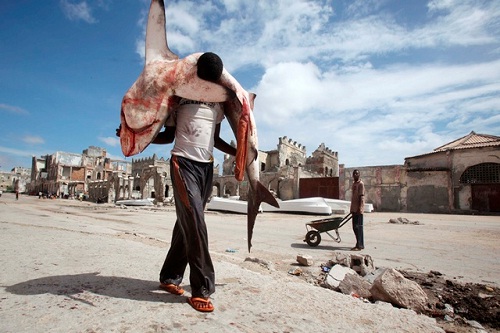
.
Potential Goldmine for Fishermen As Piracy Declines
.
December 18, 2012
Berbera, Dec 18, 2012 (UN Integrated Regional Information Networks/All Africa Global Media) -- Rusting hulks of capsized boats decorate the waters around Berbera, a port city in the self-declared republic of Somaliland. Further down Somalia`s coast, pirates raid freighters in the Gulf of Aden.
Efforts are underway to help Somalis make better use of their 3,300km coastline - the longest on the African continent - by increasing fishing and seafood exports to lucrative markets in the Middle East and Europe.
.
In 2013, the European Union will spend US$6.5 million to help Somaliland pursue its long-term goal of netting 120,000 tons of seafood each year, the sale of which could generate $1.2 billion in foreign currency.
“In Somalia, people have lived for a long time with their backs to the sea,” says Isabel Faria de Almedia, the EU development chief for Somalia. “It`s a country of agro-pastoralists with a strong nomadic tradition. We think there is a huge potential for the consumption and export of fish.”
Until the second half of the 20 th century, few Somalis outside fishing communities consumed fish and the sector was entirely artisanal in nature. This began to change in the 1970s with the development of better cold-storage facilities and the creation, with Soviet help, of an industrial fleet. But, for want of spare parts and maintenance, these vessels quickly fell into disuse. (See here for a detailed, if slightly dated overview of the Somali fishing industry.)
.
Luring pirates away from piracy
In the middle of the last decade, Somali fishermen complained they were being forced into piracy by foreign trawlers operating illegally in waters claimed by Somalia.
Coastal Somalis recount as a “eureka” moment the time self-appointed coastguards impounded a foreign trawler and levied a fine on its owners; they quickly realized seizing vessels was more lucrative than competing with commercial vessels for dwindling fish stocks.
.
Amina Farah Arshe, who employs 40 fishermen aboard 11 vessels from Berbera, the main port of Somaliland, says fishing revenues could provide an alternative to raiding freighters far into the Indian Ocean. “We can stop it by empowering the people. We can stop it by giving jobs to the youth. People would make money, the government would collect tax revenues, and piracy would diminish,” she said. “But we need support. We need training, boats, fishing gear and cold storage.”
.
For years, the United Nations has said that tackling Somali piracy should involve creating work for the jobless young Somalis who board skiffs, armed with assault rifles and rocket-propelled grenades, to hunt vessels on the high seas.
But only now has the security situation made this a realistic possibility. Somalia has recently selected its most viable president and government in years. Somali and African Union forces have driven Al-Shabab insurgents from major cities.
Out at sea, foreign warships and on-deck private security guards deter piracy. Only 70 raids took place in the first nine months of 2012, compared to 199 in the same period last year, according to the International Maritime Bureau.
.
Logistical challenge
Somalia`s new president, Hassan Sheikh Mohamud, says he wants to “increase local food production to end poverty forever”. Some 2.1 million people in the country are faced with hunger, particularly in the turbulent south.
.
The future of large-scale fishing in Somali waters is tied up in a legal dispute over how far these waters extend from the country`s coastline. While the UN Convention on the Law of the Sea, which Somalia ratified in 1989, establishes 12 nautical miles from shore as an international norm for states` territorial waters, Somalia has asserted sovereignty over seas up to 200 nautical miles from the coast. Mogadishu has resisted international pressure to declare these outer waters an exclusive economic zone, a designation which confers numerous rights to the country but which falls short of full sovereignty. (See here for more details.)
.
Alan Cole, who runs anti-piracy operations for the UN Office on Drugs and Crime, says Somaliland`s Berbera and Puntland`s Bosaso have real potential. But exporting fresh fish from the remote central coast - site of many pirate bases - offers a “logistical challenge”, he said.
The UN agency spends $40 million each year tackling piracy, helping prosecute sea-borne raiders, training and equipping coastguards, creating jobs, and providing refrigerated trucks and storerooms to the fishing industry.
“We need to get the fishing fleets of Somalia back to sea,” Cole said. “One of the challenges for fisherman is that the pirates will steal your fish. So you come back to the same issue of needing wider maritime security for Somalia so that the fishermen can safely make their living at sea.”
http://www.biyokulule.com/view_content.php?articleid=5523
.

.
Somalia`s fishermen struggle to make a living from pirate-infested seas
Hamza Mohamed
Guardian.co.uk
September 25, 2012
Hamza Mohamed: Fishermen face uphill battle to ply dwindling catch for low prices at Mogadishu market, with some succumbing to the offer of well-paid work for pirate chiefs
It`s just after 11am and a group of young men, some bare-chested, others wearing tattered T-shirts, rush in carrying fresh fish of all kinds: some carry their catch on their head; others dangle the fish by their tails. They quickly unload before rushing back to the truck parked outside to fetch more fish.
Inside, the potholed cement floor is covered with everything from dead baby sharks to sea turtles. Glowing in a dark corner buzzing with flies are the eyes of a cat with four new kittens to add to the litter of animals that live in the market. This is Mogadishu`s fish market: the biggest market in Somalia, and the only surviving one in the city.
Before the start of the civil war, the city had two such markets; the other one, which was next to Liido beach, was destroyed when a stray tank shell hit the building at the height of the conflict.
The remaining market resembles a warehouse that has seen better days. The only light comes through the dome-shaped holes in the ceiling that were once its windows. There are no shelves and customers just point their fingers at the fish they want to buy. Ali Ahmed, a fisherman who has worked at the market for more than 20 years, says earning a living has never been more difficult, even during the civil war.
The once lucrative export market has been banned for safety reasons, affecting the price local fishermen get for their catch. Between chopping and weighing blocks of shark meat for a customer, Ahmed says: “Before, we used to sell our catch to the Gulf countries and we used to get a good price; now we only sell to locals and they don`t have as much money.”
That`s not the only challenge facing Mogadishu`s fishermen, says Ahmed. When the seas are calm they go further out to fish, where they are constantly searched and interrogated by foreign navies that mistake them for pirates. “They search us and everywhere in the boat. They tell us we look like pirates,” he says.
Back on shore, they face an even greater challenge. The government and African Union forces only allow the fishermen to go out to sea before 11am and they aren`t allowed to return to shore after 5pm. This restriction is particularly unpopular with the fishermen at the market, who jostle for a chance to complain about the curfew.
“I stayed out at sea last night [after missing the 5pm curfew] because I didn`t want to risk been shot at in the dark by soldiers when I got back,” says Yasin Mohamed. “I didn`t catch any fish during the day. If I return with no fish, I can`t afford petrol for my boat next time.”
Abdirahman Sheikh Ibrahim, Somalia`s minister for fisheries, marine resources and environment, says the curfew exists for the safety of the whole city. “We are fearful of [Islamist militants] al-Shabab; we are in a state of war and the enemy can pretend to be fishermen and enter the city during these hours. We`re trying to implement a verification system. A system that`s forgery proof.”
With a dwindling catch and the difficulties they face on shore, many fishermen are abandoning the trade to try their luck in other dangerous and illicit enterprises.
“We`ve lost 80% of experienced fishermen in Mogadishu because they joined piracy gangs,” says Bashir Yusuf Barre, chairman of the Banadir fishermen`s union. “Experienced fishermen make good pirates and the bad guys know this, so they offer them good money and hire them.”
At the market, the fishermen bringing in their catch mainly appear to be in their mid-20s, suggesting the majority of more experienced seamen have left the trade.
In a shaded spot outside the market, Farah Funani, a fisherman for more than 35 years, is barking orders at a younger man nearby. “There`s no dignity in being a fisherman any more,” he says. “At sea, armed men in speedboats search you because they say you look like a pirate and when you come back soldiers can shoot you if you return outside curfew hours.”
Agents working for pirate chiefs are exploiting the situation. Funani says almost every week he gets phone calls or visits from agents offering him a lot of money. “If I`m lucky, I make $10 a day in the market. The agents are offering me as much as $4,000 a month.” The father admits it is tempting but he says: “My best friend joined them a year ago. He built a new house and bought a new car, but no one has heard from him since he went to sea four months ago.”
Pointing both hands at the sea, which is just a few metres away from the market, Bashir says: “We`ve got the longest coastline in Africa yet we can`t catch enough fish any more. We`re the poorest fishermen in Africa.”
© 2012 Guardian News & Media Limited. All rights reserved

.
http://english.alshahid.net/archives/31989

.
http://www.somaliareport.com/index.php/post/2750/Puntland_Plans_to_Expand_Bosaso_Port
.
BOOSAASO
Situado en la costa del sur del Golfo de Adén en el estuario del Cauce del río Baalade, es de facto la capital de la región Bari (gobolka) en el estado autoproclamado independiente de la República de Puntlandia. Antes Berdarqaasim, Bosaso gobierna siete distritos: Qandala, Caluula,Iskushuban, Bayla, Carmo, Baargaal, y Qardho.
La población en agosto de 2006 era de aproximadamente 500.000 habitantes, con un gran incremento desde los 50.000 que tenía en los años 1990. En Bosaso habitan la mayor parte de clanes somalíes, sobre todo el Subclan Harti de Darood y un número significativo de Árabes Mehri, también conocidos como (Maxamuud Saalax árabe). Bosaso actualmente tiene más de 30 escuelas primarias y secundarias, incluyendo la Escuela Secundaria Pública Boosaaso (con más de 2000 estudiantes), Jeque Hamdan Escuela Secundaria (aproximadamente 800 estudiantes), Imán-Alnawawi, Alnajeh, Garisa. La Universidad de África Oriental, la universidad principal de Puntlandia, también está localizada en Bosaso. UNCTAD, SIBA y la Luz del sol también proporcionan la educación moderna. Una carretera une Bosaso con Garoowe (la capital del Estado de Puntland), Lasanod, Galkayo y desde allí a Mogadiscio y Berbera. Bosaso tiene el puerto de mayor tráfico en Somalia, y cuenta con un aeropuerto principal, el Aeropuerto Internacional Doblador Qassim. Bosaso es una ciudad de acelerado crecimiento. De la misma manera que en Hargeisa y Berbera, la rápida construcción en la ciudad ha sido financiada por somalíes que viven en el extranjero en Estados Unidos y Europa.
Bosaso ha crecido desde la guerra civil, debido a que la zona en la que se sitúa atrajo a la gente de todas partes de Somalia y es relativamente estable comparado con otras partes del país. Bosaso es también el puerto principal para barcazas que llevan a emigrantes somalíes a través del Golfo de Adén para entrar (a veces ilegalmente) en Yemen, Arabia Saudí, y los otros estados de Golfo Pérsico.
http://es.wikipedia.org/wiki/Bosaso

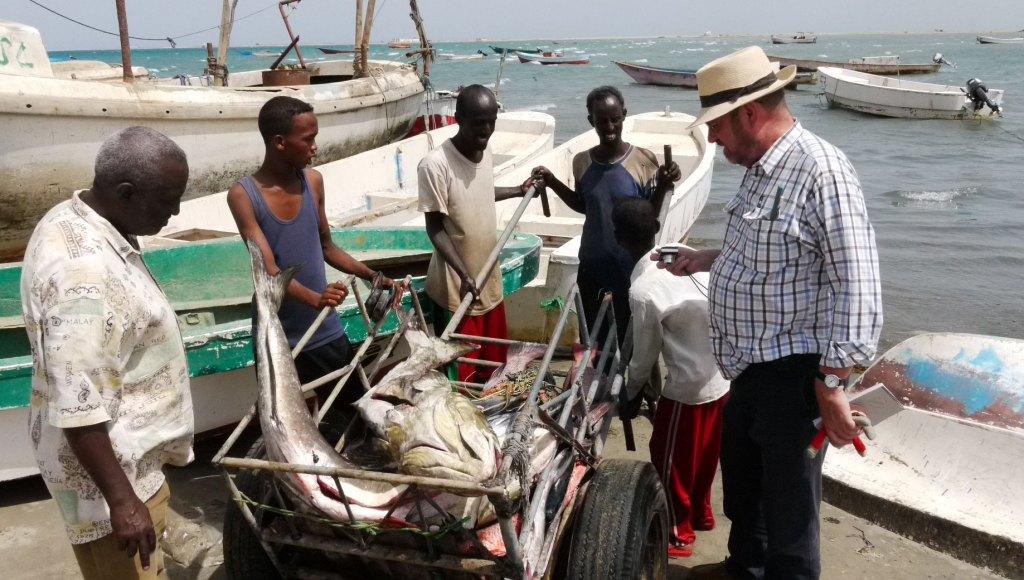
JULY 29 2012 - FoodWorks' Senior Fisheries Specialist Robert Lindleyhas been in Somaliland - and says he's impressed by what he found - at least in terms of the overall economy and civil society. Working with the CADG Group to look at investment possibilities for the fishery Bob visited fish shops in the capital, Hargeisa, and the fishing industry at Berbera.
.
BERBERA
Berbera es la capital de Saaxil, antiguamente una región de Somalia y hoy en día parte de laRepública de Somalilandia. Posee un puerto, que es el único del lado Sur del golfo de Adén que ofrece una protección considerable contra vientos y otras inclemencias. En el año 2000, su población rondaba los 200.000 habitantes.
Esta localizada en la estratégica ruta del petróleo y en 1969 se concluyó la construcción de unpuerto de aguas profundas. La ciudad, que funcionó como capital de la Somalia Británica hasta1941, se encuentra en el punto donde acaban las rutas comerciales de las ciudades de Hargeisa yBurco, debido a que su importante puerto y un reciente aeropuerto la convierten en un importante centro de comunicación y transporte de la región. Las principales exportaciones son ovejas,incienso, goma arábiga y mirra. Su principal socio en el comercio marítimo es la ciudad de Adénen Yemen, 240 km al Norte.
Antes de la guerra civil en Somalia, en la ciudad se encontraba un pequeño puerto construido por la armada soviética, que luego fue usado por los Estados Unidos. Cuando las tropas se retiraron, la zona pasó a ser parte del puerto comercial.http://es.wikipedia.org/wiki/Berbera
.
.
Fish Types in Somaliland
somafish.org/index.php?option=com...En caché - Traducir esta página
Posted at: Tuesday, October 19 2010 18: 03: 23 ... Welcome to Somaliland Fishing Association Website ... Two days training workshop for berbera fishing ...
[PDF]
Summary of Somaliland Fishery Development ... - getco home page
www.getcosom.com/All%20Web%20Updating%...Similares - Traducir esta página
Formato de archivo: PDF/Adobe Acrobat - Vista rápida
report on fishery sector in Somaliland that was jointly developed by Ministry of ... Therefore, the concept of establishing Berbera cold storage facility was followed ...

SPECIFICALLY SOCOTRA: Welcome to the strange island of Socotra. This photo series documents some of the strange landscapes from this small island off the horn of Africa. As always, click photos to embiggin. If you’re just joining us, this is what you’ve missed so far:
The Myth of the Dragon Blood Tree
Attn: Crayola — A New Color For You — Socotri Cerulean
http://blog.jonahkessel.com/page/3/
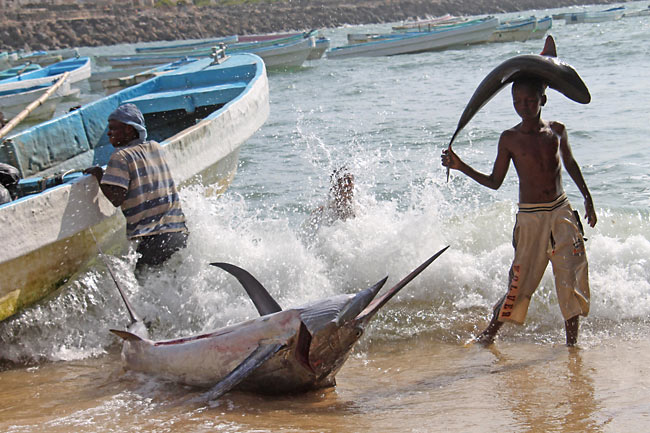
.



